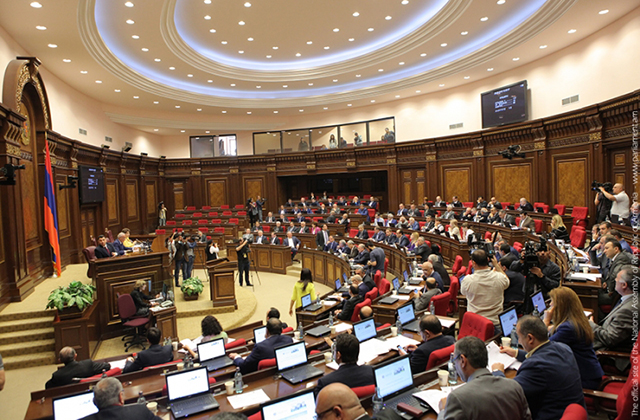
Authorities vs Authorities

A resolution is included in today’s agenda of RA NA session, pursuant which from 1 July 2016 excise stamps dated “2012” for commodities subject to labeling defined by RA Law “On excise tax” imported to Armenia or produced in the Republic of Armenia will be eliminated.
Pursuant the same resolution, selling of commodities imported to Armenia and produced in Armenia labeled with excise dated “2012” is permitted until January 2018. And finally, upon the 3rd point of the resolution the Chairman of State Revenue Committee (SRC) is assigned to confirm until 1 October 2016 the order of eliminating excises dated “2012,” not allocated to taxpayers or not returned to the taxation body by the taxpayers and provide performance of that work.
It’s a simple technical resolution, which won’t have any influence on business or tax collection. However, the most noteworthy is not the draft, but what follows it.
Upon the established order various offices submit their conclusions and proposals regarding resolutions to be approved. For instance, the Minister of Finance concluded that by adopting this resolution reduction of incomes or increase of expenditures isn’t anticipated. Ministry of Economy hasn’t submitted proposals.
The only body submitting conclusion and proposal is the Ministry of Justice, which is rather strict. RA Ministry of Justice concluded that the draft contradicts RA Constitution.
It turns out that the offer by the Ministry of Justice wasn’t approved by RA Government. This means two things: either the Government considers that the draft bill doesn’t contradict RA Constitution, by that casting doubt upon competency of the Ministry of Justice, or it agrees that it’s anti-constitutional, however, it doesn’t hinder. In both cases lots of questions emerge.
It’s important to record the fact that one state office is contradicted to the other. This is not bad.
Media outlets have already reported that the draft bill to the Tax Code developed for 2 years is ready and is being discussed at the National Assembly. Soon it’ll be submitted to the MPs, as international financial organizations funded development of the draft bill defined a deadline—the Tax Code should be ready in the period of two years.
It seems there is no any problem: the NA will vote, like in case of almost all legislative initiatives submitted to the Government. However, the NA seems to have intentions to make a surprise. RA NA Economic Department strictly criticized this document. For instance, groundings by authors of Tax Code are under suspicion, regarding to reduce turnover tax threshold from AMD 115 million to AMD 40 million.
NA Economic Department, basically adopted also the critics regarding the income tax, stating that offered changes of rates mainly pursue fiscal goals, making tax burden of overwhelming majority of income taxpayer even more. “As a result, we consider, that actual purchasing capacity of the main part of employees will considerably reduce and will contribute to flow increase (in particular, to the Russian Federation, where rate for this tax comprises 13-15%),” the conclusion reads. This, slightly said, is utter accusation addressed to the executive body to instigate migration and impoverish people.
A few days ago at the joint session of NA Standing Committees during the discussion of performance of state budget 2015 there was a disagreement between Vardan Ayvazyan, Chair of the Standing Committee on Economic Affairs, and Armen Alaverdyan, deputy head of State Revenue Committee (SRC), linked to consumption reduction and customs clearance of cars. It’s worth also stating that the legislative wing contradicts to the executive one.
4 weeks ago the Prime Minister touched upon the fight against monopolies, corruption, unproductive expenditures. Of course, not everybody believes in the success of that fight, and doesn’t believe in the statement and its successive steps.
However, it’s worth fixing the following fact: the Government did it upon its own initiative, without pressure of the opposition. Yes, the April war played its role here, which revealed the issue and made urgency of their settlement obvious. However, it’s worth stating once again that parliamentary opposition didn’t have its role here.
It also didn’t have its role when the Government postponed installation of compulsory component of accumulative pension system. In short, there was an impression that authorities launched a fight with themselves, inside them. Many say that elections are ahead, this is the reason. However, it’s not clear, isn’t the opposition getting ready for elections? Parliamentary opposition at this moment (in particular, on economic issues) not only doesn’t dictate agenda, but generally lacks. Regarding problematic laws, resolutions and initiated steps, civil society organizations and some extra-parliamentary powers are mostly active, which don’t have such a big value.
Opposition representatives from time to time during NA or commission sessions attempt to direct sharp questions, however issues, as a rule, are not raised by them, but they simply repeat questions reflected in the press. And upon their own initiative they sometimes pose not professional issues, which aren’t given even by starter reporters.
In short, Armenia’s parliamentary opposition either doesn’t cope with economic events (except some individual MPs), or simply don’t want to go deep into thick legislative files. Yes, we never had classical “shadow” opposition, where those responsible for the respective field would really weaken the MPs. However, practice of ignorance to that degree hasn’t been recorded long ago.
By Babken Tunyan

























